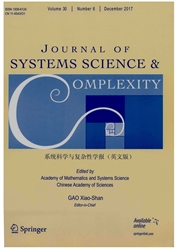

 中文摘要:
中文摘要:
就供应商基于 FCFS (first-come-first-service ) 原则在顺序在联系零售商的一个一个供应商和二零售商的供应链背景而言,作者在合同设计,供应链利润和利润分发上调查供应链成员的额外获得的有罪的公平担心的边缘的效果。当供应商考虑损失的分布公平时,厌恶和额外获得的有罪的、额外获得的有罪的担心减少最佳的批发和零卖价格,并且改进供应链性能。什么时候第一或第二个零售商考虑分布公平和导致同伴的公平,最佳的批发和零售定价,但是增加的额外获得的有罪的担心减少所有供应链成员的利润仅仅当损失厌恶的水平足够大时并且水平额外获得有罪是不到 1/2。不管多么当损失厌恶的水平是小的时并且水平额外获得有罪是不到 1/2,额外获得有罪没在供应链性能上有影响。分析表明供应链表演能被考虑公平进一步改进额外获得有罪。
 英文摘要:
英文摘要:
Considering a one-supplier and two-retailer supply chain setting in which the supplier makes contacts with retailers in sequence based on FCFS (first-come-first-service) principle, the authors investigate the marginal effect of extra-gain guilty fairness concerns of supply chain members on the contract design, supply chain's profit and profit distribution. When the supplier considers distributional fairness of loss aversion and extra-gain guilty, extra-gain guilty concern reduces the optimal wholesale and retail price, and improves supply chain performance. When the first or the second re- tailer considers distributional fairness and peer-induced fairness, extra-gain guilty concerns decrease the optimal wholesale and retail price but increase the profit of all supply chain members only when the level of loss aversion is large enough and the level of extra-gain guilty is less than 1/2. However, when the level of loss aversion is small and the level of extra-gain guilty is less than 1/2, extra-gain guilty has no influence on supply chain performance. The analysis reveals that the supply chain performance can be further improved by considering fairness of extra-gain guilty.
 同期刊论文项目
同期刊论文项目
 同项目期刊论文
同项目期刊论文
 期刊信息
期刊信息
